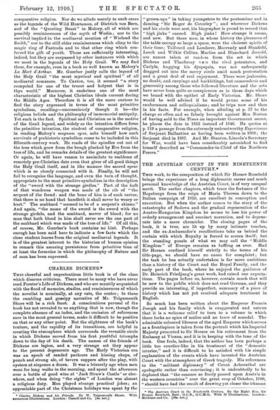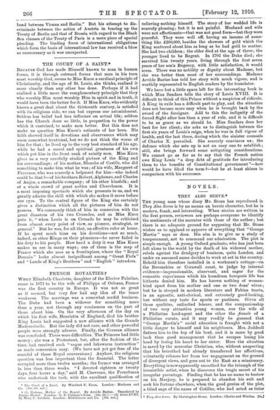THE AUSTRIAN COURT IN THE NINETEENTH CENTURY.*
THIS work, to the composition of which Sir Horace Rumbold brings the experience of a long diplomatic career and much personal knowledge of the Austrian Court, is of very unequal merit. The earlier chapters, which trace the fortunes of the Hapsburgs from the reign of Maria Theresa down to the Italian campaign of 1859, are excellent in conception and execution. But when the author comes to the story of the catastrophe of Sadowa and the gradual regeneration of the Austro-Hungarian Kingdom he seems to lose his power of orderly arrangement and succinct narration, and to degene- rate into a mere chronicler. The closing pages of the book, it is true, are lit up by many intimate touches, and the ex-Ambassador's recollections take us behind the curtain with which Royalty is forced to screen itself; but the standing puzzle of what we may call the " Middle Kingdom" of Europe remains as baffling as ever. Had Sir Horace confined himself strictly to the terms of his title-page, we should have no cause for complaint ; but the task he has actually undertaken is far more ambitious than a history of the Court and the Royal Family, and the early part of the book, where be enjoyed the guidance of Dr. Heinrich Friedjung's great work, bad raised our expecta- tions. The pages before us, however, contain much that will be new to the public which does not read German, and they provide an interesting, if imperfect, summary of a piece of history which has not yet received adequate treatment in English.
So much has been written about the Emperor Francis Joseph and his family which is exaggerated and untrue that it is a welcome relief to turn to a volume in which there lurks no spice of malice and no trace of scandal. The admirable coloured likeness of the aged Emperor which serves as a frontispiece is taken from the portrait which his Imperial Majesty presented to Sir Horace on his retirement from the Embassy at Vienna, and it is in keeping with the tone of the book. One feels, indeed, that the author has been perhaps a little too courtier-like in his treatment of the " domestic interior," and it is difficult to be satisfied with his simple explanation of the events which have invested the Austrian Court with the atmosphere of Greek tragedy. His references to the " militant diplomacy" of Count Aehrenthal are apologetic rather than convincing ; it is undoubtedly to be deplored that " the censure so freely passed upon Austria in the western countries" over the great coup of October, 1908, " should have had the result of drawing yet closer the irksome • The Austrian Court in the Nineteenth Century. By the Right Hon. Sir Horace Rombold, Bart., G.C.B., G.C.M.G. With 18 Illustrations. London Methuen and Co. [1es. net.]
bond between Vienna and Berlin." But his attempt to dis- criminate between the action of Austria in tearing up the Treaty of Berlin and that of Russia with regard to the Black Sea clauses of the Treaty of Paris is a mere piece of special pleading. The binding force of international obligations which form the basis of international law has received a blow as unnecessary as it was unexpected.











































 Previous page
Previous page